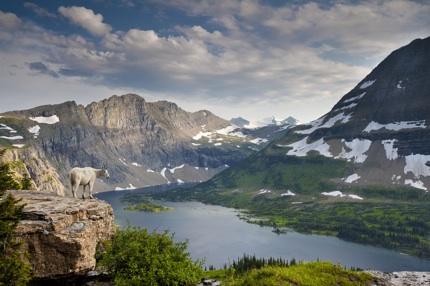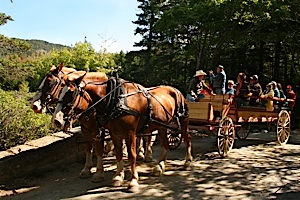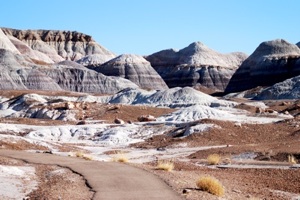One topic has been glaringly absent from the building presidential campaign: the use and management of the United States' public lands. Unless the two major political parties are entirely tone-deaf, they might want to start touching on that topic from time to time, as a new poll shows overwhelming support for conservation of those lands.
The national survey, conducted by The Nature Conservancy, claims that more than four in five voters believe the country's national parks, forests, and other public lands with their forests, lakes, streams, beaches, and meadows should be properly managed and conserved, that, in fact, it's patriotic to do so.
TNC officials say that in addition to that overwhelming general support for public lands conservation, "three-quarters of the American electorate says that 'one of the things our government does best' is protecting its 'history and natural beauty through national parks, forests and other public lands.' Not surprisingly, then, three-fourths of voters say they would prefer to go on vacation this summer in a national park or other public lands."
“Many, many Americans spend the Fourth of July holiday outdoors—in a local park, at the beach, on the water, or in a National Park,” said Mark Tercek, president and CEO of The Nature Conservancy. “In effect, by our actions we are celebrating and enjoying both the creation of our republic and the long history of our country’s commitment to conservation of our land and water. These poll numbers reveal that the overwhelming majority of Americans still believe in conserving our natural resources and that this is, in fact, patriotic.”
A release from TNC states that "(V)oters also voiced overwhelming support for a number of specific federal policies to support conservation. Three-quarters (74 percent) of American voters say that even with federal budget problems, funding for conservation should not be cut. Many voters even are willing to reach into their own pockets to fund conservation, with 83 percent—including more than seven-in-ten voters across the political spectrum—willing to pay more in taxes to fund protection of land, water and wildlife habitat in their area.
More so, the poll shows that 79 percent of those contacted believe the country can protect land and water and have a strong economy at the same time.
“Given these poll results, we are deeply concerned that public conservation policy in our country today is departing from America’s bipartisan conservation tradition and does not reflect the current thinking of Americans across the political spectrum. In particular, the idea that there is inevitably a conflict between our economy and our environment is not borne out by popular views,” said Mr. Tercek in a release. “The vast majority of Americans value the many ways nature benefits them and their communities—just as strongly as they always have.”
Key findings of the poll:
* More than four-in-five American voters say that “conserving our country's natural resources - our land, air and water - is patriotic.” This sentiment bridges every partisan, regional, and demographic division. For example, agreement that conservation is patriotic is high among Democrats (89 percent agree conservation is patriotic), Independents (79 percent) and Republicans (79 percent), including Tea Party Republicans (79 percent);
* Voters who are undecided and up for grabs in the presidential election (93 percent) and those in the eight most contested “battleground” states (83 percent);
* The youngest voters under age 35 (84 percent) and voters age 65 and older (83 percent); urban residents (79 percent), suburbanites (85 percent) and rural residents (82 percent); hunters (79 percent), anglers (80 percent), and bird and wildlife watchers (82 percent); hikers (80 percent), mountain bikers (78 percent), and ATV users (77 percent); and more than seven-in-ten voters in every region of the country agree that conservation is patriotic.
Horse-drawn rides at Acadia National Park lure visitors. NPS photo.* Three-quarters of the electorate believes that public lands are one of the things government “does best.” Even focusing in on the role of government at a time of heightened cynicism about government as an institution, voters overwhelmingly say that public lands are evidence of an area of positive federal contribution. Fully 77 percent agree that “(O)ne of the things our government does best is to protect and preserve our national history and natural beauty through national parks, forests, and other public lands,” with 39 percent strongly in agreement.
Three-quarters of Republicans (76 percent), nearly the same number of Democrats (70 percent) and the vast majority of Independents (82 percent) agree with this view. Underlying some of this support and willingness to pay may be a sense that there are economic benefits to conservation. Voters are twice as likely to say that protections for land, air, water and wildlife have a positive impact on jobs (41 percent), than a negative impact (17 percent), or little impact one way or the other (33 percent).
More voters view conservation as having a positive impact than a negative impact in every region of the country, including in the Western U.S. where there are significant holdings of public lands (and where 43 percent see a positive economic impact, versus just 21 percent negative). Not surprisingly, those who do participate in outdoor recreation of one sort or another are much more likely to perceive an economic benefit to protections of land, water and wildlife than those who are not engaging in these outdoor activities. In fact, public lands such as some of the iconic national parks, are far preferred in Americans’ summer vacation plans over major American cities.
Three times as many voters say they would prefer a vacation this summer in “a national park or other public lands like the Grand Canyon or Great Smoky Mountains” (70 percent). Americans of every age and region of the country, and irrespective of whether they engage in outdoor recreation or not, are more likely to prefer enjoying some time off on public lands.
Voters validate their support for conservation by strongly backing specific policies. For example,voters firmly back a federal policy to dedicate funding toward conservation. More than four-in-five American voters (82 percent) support ensuring that a “portion of federal offshore drilling fees already being paid by oil and gas companies is dedicated to the Land and Water Conservation Fund, which was created by Congress so that these fees could be used for conserving natural areas, wildlife, and clean water and providing access to outdoor recreation throughout the country.”
Three-quarters say that even with federal budget problems, funding for conservation should not be cut. Fully 74 percent agree that “even with federal budget problems, funding to safeguard land, air and water should not be cut,” including a majority of voters across the partisan spectrum and two-thirds or greater in every region of the country.
Voters are willing to put their money where their mouth is. Fully 83 percent are willing to pay additional taxes to protect American land, water and wildlife.When provided with a range of dollar amounts to pay in increased taxes, the vast majority of voters are willing to pay some amount more, including 72 percent of Tea Party Republicans, 73 percent of self-described conservatives, 88 percent of moderates, and 94 percent of self-described liberals.
Americans overwhelmingly want places, such as Petrified Forest National Park, properly protected and managed. Kurt Repanshek photo.The overwhelming majority of American voters reject the notion that protecting our environment is at odds with a strong economy.
While voters express a high degree of concern about the economy (80 percent characterize it as an extremely or very serious problem in their area), they do not view strengthening the economy as being in conflict with conservation. More than three-quarters of voters (79 percent) believe we can protect land and water and have a strong economy at the same time.
“Overall, it is clear that conservation is an issue that more often unites, rather than divides, the American people,” said David Metz, pollster from Fairbank, Maslin, Maullin, Metz & Associates (D). Lori Weigel from Public Opinion Strategies (R) added, “Whether it is a general sense of patriotism and pride in national parks, or support for several specific federal policies, the survey finds a great deal in common among Americans regarding their views on conservation.”
The national survey of voters was conducted by the bipartisan research team of Fairbank, Maslin, Maullin, Metz & Associates (D) and Public Opinion Strategies (R) from June 16-19 at the request of The Nature Conservancy. FM3 and POS completed 800 telephone interviews with registered voters nationally who are likely to cast ballots in the 2012 election. Interviews were conducted on landlines and cell phones. The margin of sampling error for the full sample is +/-3.46 percent; margins of sampling error for subgroups within the sample will be larger. Some percentages may sum to more than 100 percent due to rounding.






Add comment